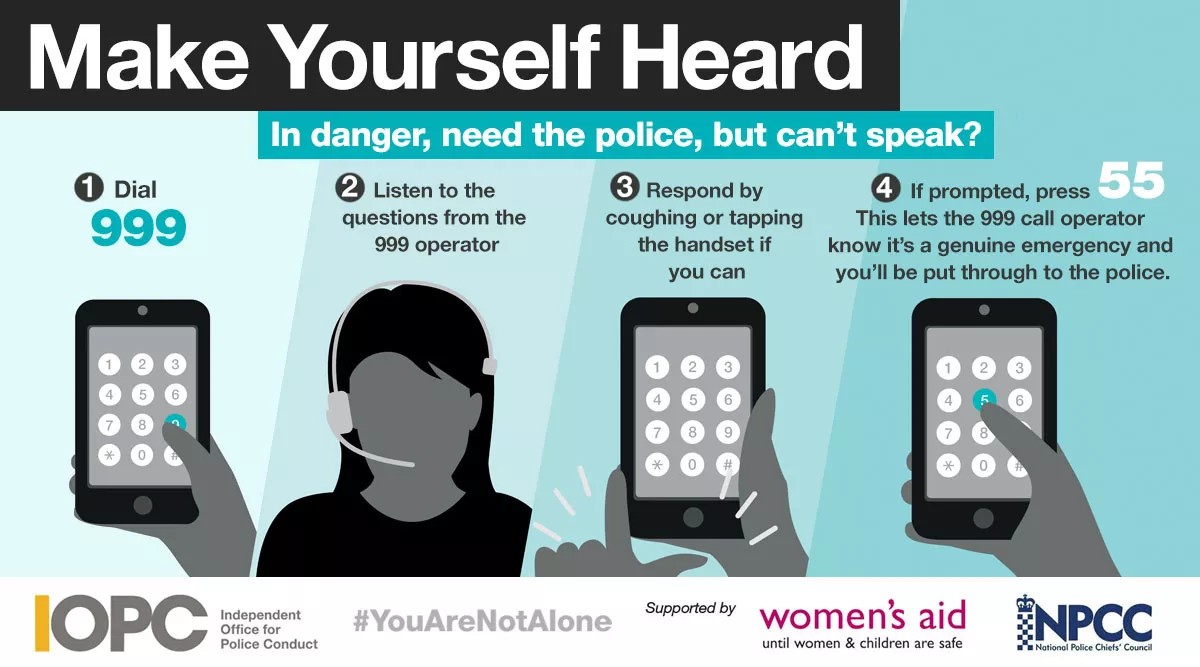National campaign to raise awareness of the Silent Solution system
PLEASE NOTE: Updated campaign posters and social media graphics are available here
A national campaign to raise awareness of a system to help people alert police when in imminent danger but unable to speak, is being launched by the Independent Office for Police Conduct today (8th April 2019).
The Silent Solution system enables a 999 mobile caller who is too scared to make a noise, or speak, to press 55 when prompted – to inform police they are in a genuine emergency.
The system is well-established in the UK but is only effective if the public know and understand how it works. It could, in extreme situations, potentially save a life.
The IOPC-led ‘Make Yourself Heard’ campaign is being launched during National Stalking Awareness Week (8th – 12th April), with support from the family of murder victim Kerry Power, Women’s Aid and Welsh Women’s Aid, and the National Police Chiefs’ Council.

Prior to her murder, Kerry believed that if she made a silent 999 call she would not need to speak or make a noise for police to send assistance. Sadly her call was terminated and was not put through to the police control room because she did not know to use the Silent Solution system.
It is not true that police will automatically attend if you make a silent 999 call. Callers need to listen and respond to questions and instructions, including by coughing or tapping the handset if possible, or if using a mobile phone, once prompted by the automated Silent Solution system, pressing 55.
The system filters out thousands of accidental or hoax silent 999 calls made daily. Around 50 emergency calls from mobiles a day are transferred by a BT operator to police forces in the UK as a result of someone having pressed 55 when prompted, enabling the police to carry out urgent enquiries to respond.
IOPC Regional Director Catrin Evans said: “It is always best to actually speak to a police call handler if you can, even if by whispering, but if you are putting yourself or someone else in danger by making a sound, there is something you can do.
“Make yourself heard by coughing, tapping the handset or once prompted by the automated system, by pressing 55.
“We found from our investigation into police contact with Kerry that there is a lack of public awareness of the Silent Solution system and are keen to share this important information as widely as possible. It could potentially save a life.”
Kerry made her silent 999 call in the early hours of 14 December, 2013 when her ex-partner and stalker broke into her home. She did not respond to the BT operator’s instructions and her call was transferred to the Silent Solution system. As 55 was not pressed, the call was terminated and Devon and Cornwall Police were not notified of Kerry’s call. Her ex-partner David Wilder called police later that morning to report he had fatally strangled her.
Kerry’s family said: “Happy, fun-loving and considerate are all words you could use to describe Kerry, however the one thing everybody would mention first would be that she was the consummate mum.
“After a split from her son’s dad and a tough few years, things were on the up, Kerry was back to her old self and was looking forward. Unfortunately this was all brought to an end by the brutal actions of her ex-partner in December 2013.
“After weeks of stalking and inappropriate behaviour, he broke into Kerry’s house with a key he had previously had cut, unable to accept her decision to end their relationship. As things escalated Kerry became worried for the safety of herself and her son, who was asleep upstairs and called 999.
“Although she was not able to speak for the fear of alerting the intruder to her actions, she followed the advice given by a police officer during an earlier visit; that she could call and not speak, as the police held her details they would be alerted and attend.
“Unbeknown to Kerry, this was fiction and nobody came…… a short while after the call, she was strangled.”
Our investigation could not conclusively identify the wording the police officer used when advising Kerry about making an emergency call however it was clear she did not know she would need to press 55 when prompted by the Silent Solution system.
Lisa Johnson, Manager of Direct Services at Women’s Aid, said: “For survivors of domestic abuse calling the police might be too dangerous. Many abusers will threaten to hurt or even kill them if they try to speak out about the abuse. This means that for far too long many women have not been able to access the emergency support they so desperately need from the police.
“For a long time we have been encouraging survivors to use the Silent Solution system to make a silent 999 call if they feel it would be dangerous for them to speak to the call operator. That’s why we are pleased to work with the IOPC to help raise awareness of the system so that survivors can call 999 without putting themselves at further risk and prevent further lives, like that of Kerry Power, from being taken.”
National Police Chiefs’ Council Lead for Contact Management, ACC Alan Todd said: “One of the fundamental roles of police is to help people in an emergency. The police service receives 12 million 999 calls each year, and a small number of callers need to use the ‘Silent Solution’ as they are not able to use their voice during an incident.
“This solution ensures that those who need assistance can make themselves heard through a simple and straightforward process.”
As part of the Make Yourself Heard campaign, we have produced graphics, a poster and a ‘How to Guide’, which we hope will be shared widely to raise awareness of the Silent Solution system and debunk the myth that a silent call by itself will automatically bring help. These are available to download, in English and Welsh, from our website.
- Around 20,000 silent 999 calls (where no response is obtained to questions) are made a day. Of those, around 5,000 are transferred to the Silent Solution system because doubt whether the call is genuine exists. The 55 instruction is detected around 50 times a day (1 per cent of all silent calls put through to the system).
- The IOPC oversees the police complaints system in England and Wales. The Silent Solution system is used throughout the United Kingdom.
- Women’s Aid is the national charity working to end domestic abuse against women and children. The 24 Hour National Domestic Violence Helpline on 0808 2000 247 (run in partnership with Refuge) and our range of online services, which include the Survivors’ Forum, help hundreds of thousands of women and children every year.
- The Next Generation Text service, run by BT, is designed for people who are deaf, hard of hearing or have a speech impairment. You need to register your mobile number before using the service. Visit the NGT website for information



